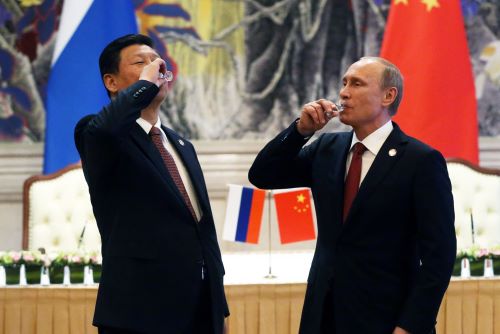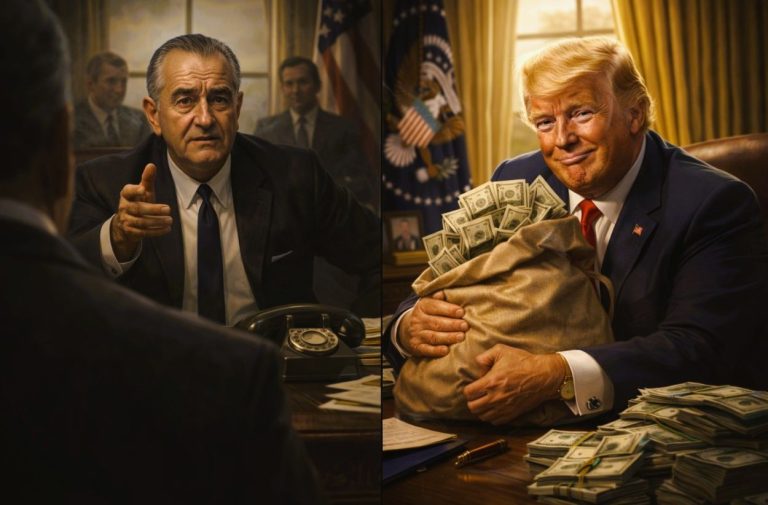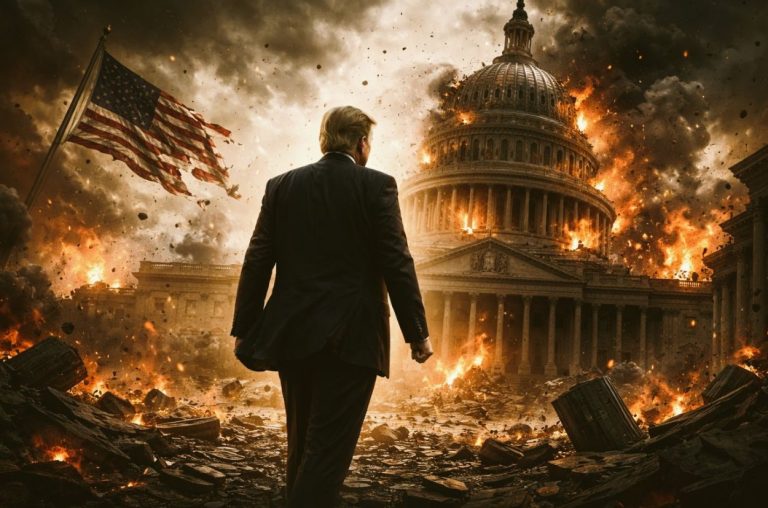

In Trump’s America, they see the mirror image of their dreams.

By Matthew A. McIntosh
Public Historian
Brewminate
Introduction
As the 2024 U.S. presidential election reintroduced Donald Trump into the global spotlight, many geopolitical observers have shifted focus toward how America’s strategic adversaries—namely Xi Jinping of China and Vladimir Putin of Russia—stand to benefit. While U.S. politics convulses in bitter division, authoritarian leaders across the globe see opportunity. For Xi and Putin, a Trump return isn’t merely an American domestic issue—it’s a strategic windfall. And they know how to exploit it.
Here I delve into how Xi and Putin hold, and continue to strengthen, their upper hand with Trump in power—or even simply on the horizon of power. From diplomatic manipulation and propaganda advantages to economic repositioning and military leverage, the long game of autocracy is paying dividends.
Trump’s Unraveling of U.S. Alliances: An Authoritarian Dream
Overview
The backbone of America’s global influence has always been its alliances—NATO, the EU, Pacific partnerships, and democratic coalitions. Trump has long made his disdain for these structures clear, calling NATO “obsolete,” criticizing South Korea and Japan for not paying enough for U.S. protection, and showing open admiration for strongmen over democratic allies.
This ideological rupture is precisely what Xi and Putin want.
Putin’s Objective
Weaken NATO, divide Europe, and undermine transatlantic unity. Under Trump, the cracks widen. If NATO collapses—or if the U.S. withdraws—Russia is no longer checked in Eastern Europe. The invasion of Ukraine, costly and resisted now, becomes potentially normalized or tolerated under a disjointed West.
Xi’s Objective
Isolate the U.S. in the Indo-Pacific and seize strategic space in Taiwan and the South China Sea. Trump’s transactional foreign policy reduces U.S. reliability, leaving countries like the Philippines, Taiwan, and South Korea wary. China then moves into the vacuum, offering economic carrots through the Belt and Road Initiative while flashing military sticks.
By turning America inward and skeptical of alliance-building, Trump enables Xi and Putin to pursue their regional ambitions unchecked by the global coalition that once held firm.
The Propaganda Coup: Democracy in Disarray
The January 6 insurrection, the endless disinformation campaigns, the criminal trials of a former president—these are gifts to state propaganda machines in Beijing and Moscow.
In China, state-run media paint the U.S. as a faltering, hypocritical power. Trump’s populist chaos is used to undermine pro-democracy sentiment in places like Hong Kong and Taiwan. “Why follow the American model?” they ask, “when their own democracy is in flames?”
In Russia, Trump has always been portrayed as a symbol of a crumbling liberal world order. Kremlin-controlled outlets celebrate his every outburst against institutions, courts, and journalists. It fits the Putinist narrative perfectly: Western democracy is a lie, and only strongman rule brings order.
Every time Trump delegitimizes elections or calls for political retribution against opponents, he feeds the narrative that Western democracy is unstable, vindicating Xi’s and Putin’s authoritarian models.
The Economic Advantage: Strategic Decoupling and Dollar Disruption
Overview
Trump’s economic nationalism plays directly into the hands of both Xi and Putin. His erratic trade wars, threats to upend global trade pacts, and promises of isolationist policies allow them to exploit America’s retreat from globalization.
Xi’s Response
China accelerates its efforts to create an alternative trade order. The Regional Comprehensive Economic Partnership (RCEP), increased yuan-denominated trade, and digital currency projects all benefit from Trump’s trade hostility. If Trump severs ties with global institutions, China becomes the default economic power broker for much of Asia and Africa.
Putin’s Response
Russia, reeling under sanctions, seeks to evade the dollar-based global financial system. Trump’s open hostility toward U.S. sanctions regimes, and his past efforts to ease restrictions on Russia, give the Kremlin breathing room. The ruble-yuan agreements and efforts to build BRICS-based alternatives to SWIFT gain credibility.
Trump may believe he’s punishing adversaries economically, but in practice, he isolates the U.S. while Xi and Putin build economic bridges elsewhere.
Psychological Warfare: Playing to Trump’s Ego
Both Xi and Putin have learned that Trump’s ego is not merely a vulnerability—it’s a lever.
Putin’s Game
During Trump’s presidency, the world watched as Trump publicly sided with Putin over U.S. intelligence at Helsinki. Flattery, symbolic gestures, and “strongman” admiration won Trump’s favor time and again. Trump views Putin as a masculine leader and has openly praised his “smart” moves—even the invasion of Ukraine. This boosts Putin’s domestic standing and weakens America’s moral authority abroad.
Xi’s Tactics
China uses a subtler game. While Trump raged about tariffs, Xi rarely engaged in personal insult. Instead, Beijing presented Trump as an unpredictable but manageable figure—an emperor of impulse. Through careful diplomatic engagements and economic bait, they showed they could withstand his tantrums while planting deeper roots in global institutions Trump was abandoning.
Trump is not a strategist. Xi and Putin are. That mismatch is being exploited in real time.
The Erosion of Democratic Norms: Internal Paralysis as External Opportunity
Perhaps the greatest gift Trump gives to Xi and Putin is internal American chaos.
With Trump stoking conspiracy theories, attacking judicial independence, and promising retribution against political enemies, the U.S. risks entering a period of constitutional crisis. Xi and Putin know that when democracies turn inward—consumed by their own dysfunction—they stop projecting power abroad.
An America locked in legal, social, and political warfare cannot meaningfully respond to a Taiwan crisis, a Baltic incursion, or a Middle East flashpoint. This paralysis is precisely what autocrats count on.
Conclusion: The Long Game Belongs to the Strongmen
Xi Jinping and Vladimir Putin do not operate on four-year electoral timelines. They play decades ahead. In Donald Trump, they find not only a useful fool but a destabilizing force that weakens the very foundations of America’s global power.
For them, it is not about direct support of Trump—but about ensuring his rise causes maximal friction, isolation, and degradation of American influence. In Trump’s America, they see the mirror image of their dreams: fractured society, neutered institutions, and pliable leadership. They do not fear Trump. They prefer him.
In this game of power, the United States faces not just two hostile leaders, but two patient strategists who have learned exactly how to hold the upper hand—because Trump, for all his bluster, keeps handing it to them.
Originally published by Brewminate, 06.19.2025, under the terms of a Creative Commons Attribution-NonCommercial-NoDerivatives 4.0 International license.


